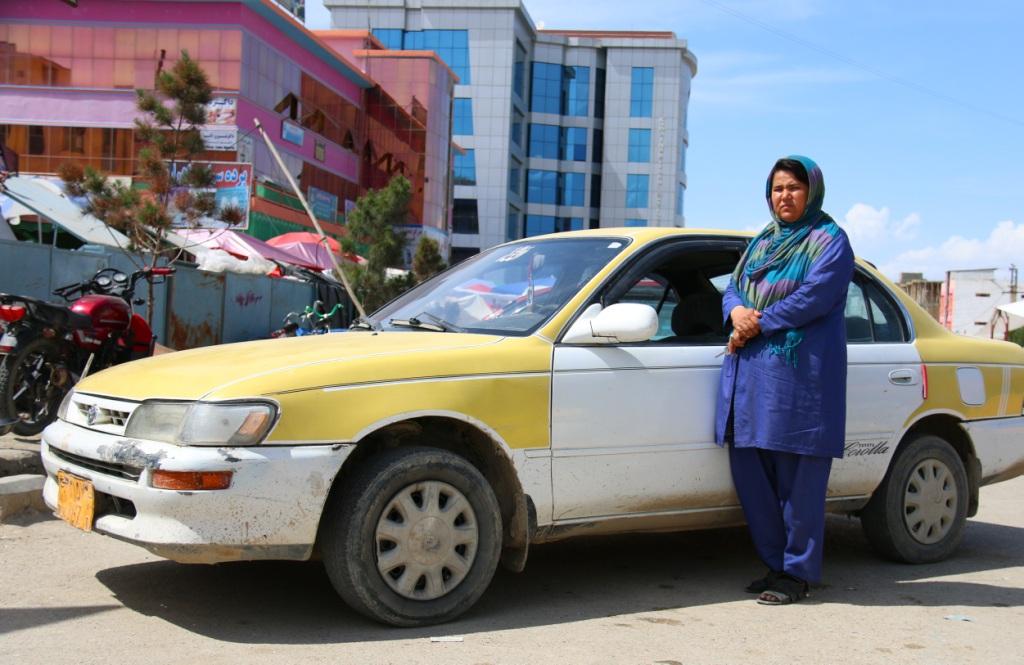By Asghar Noor Mohammad , Mazar-I-Sharif
Not content with being Afghanistan’s first female taxi driver, Sara Bahai is also a teacher, a beekeeper and a human rights activist. In a country where driving is mainly done by men, Bahai continues to challenge the norm, even venturing into dangerous neighbouring regions, risking her life to taxi passengers and settle disputes.
From behind the wheel, Sara can see men driving towards her waving their hands. As she approaches one taxi, the driver swerves one way then the other, laughing as Sara narrowly avoids it and drives past.
“Male cabbies sometimes swerve at the last minute then laugh to make fun of me,” says Sara Bahai, 40, believed to be Afghanistan’s first female taxi driver. Yet the breadwinner in a family of ten drives on, seemingly unperturbed.
Bahai, who also teaches at Mavlana Jalaluddin Muhammad Balkhi High School part-time, began ferrying passengers around Mazar-e Sharif to increase her income to 5000 afghani (approx. 90 USD) per month.
Reinventing the wheel
 “Tough circumstances made me sell the property I inherited from my father,” says Bahai, talking outside her home in Mazar-e Sharif. “With the money, I bought a car 10 years ago. I have been a cab driver for the past five years.” Every day, Bahai taxis passengers to and thro on the Kamarband-e-Baba to Yadgar route – from the heart of Mazar-e-Sharif city to the suburbs.
“Tough circumstances made me sell the property I inherited from my father,” says Bahai, talking outside her home in Mazar-e Sharif. “With the money, I bought a car 10 years ago. I have been a cab driver for the past five years.” Every day, Bahai taxis passengers to and thro on the Kamarband-e-Baba to Yadgar route – from the heart of Mazar-e-Sharif city to the suburbs.
These journeys alone pose substantial danger to Bahai, yet Mazar’s female cabbie has ventured into far more dangerous territory before, even escorting passengers to Maimama in neighbouring Faryab Province, a site of active anti-government insurgency. “Taliban regularly shoot at police checkpoints on that road,” said a spokesman for the Afghan National Police, preferring not to be identified.
Sara herself is driven by the reliance her family place upon her: she has a brother with a disability, a sister-in-law, four nephews, two adopted children and an ailing mother who has an illness. She is responsible for them all.
‘Human Rights Mobile’
Besides trailblazing a path for women on Afghan roads and supporting her family, Bahai is also an active human rights activist. “When I get a call, I have to get the scene as soon as possible and solve the problem,” says Bahai, who works with a coalition of human rights groups in Balkh Province. “This car can be of a lot of help for me. Helping others with family-related issues is one of the reasons why I bought this car.” According to Sara, in some cases, the situation is dire to the point that family members often get physical with their own relatives. Still, she claims to have saved several divorces and to have helped many women study.
Bahai says she continues to meet resistance from colleagues in the trade but that sometimes people welcome the sight of her driving too, even in the most unexpected of places. “When I went to Shulgara District, which is insecure, elders saw me driving. They smiled and waved at me. That is how they welcomed me,” Bahai told Afghanistan Today.
Back seat view
In the back of Bahai’s taxi, three passengers don’t seem to mind that their driver is a woman. “Some people say that under Islam, the saddle of horses and other four-legged animals is haram for women, but I tell them that cars are not haram,” says Abdul Kareem, an elderly passenger returning home from shopping in the city centre.
“After the Taliban regime was toppled, women managed to get out of homes and have been playing bigger and bigger roles in the society since then, but people are still not as open-minded when it comes to women and their rights.”
Despite the difficulties, Bahai has responded by multitasking. problems. Besides teaching, being a taxi driver a human rights activist and head of family, Bahai is also an avid beekeeper.
Bee’s knees apiarist
 Four years ago, Sara bought a box of bees for 4,000 afghani (70 US dollars approx) and now has 20 boxes, as well as all the help she needs from her brother, Taqarol Naqshbandi, director of the bee farming department at the Provincial Department of Agriculture. The female cabbie makes an extra 20,000 afghani (350 US dollars) each season on the side selling home-made honey for around 15 US dollars per pot.
Four years ago, Sara bought a box of bees for 4,000 afghani (70 US dollars approx) and now has 20 boxes, as well as all the help she needs from her brother, Taqarol Naqshbandi, director of the bee farming department at the Provincial Department of Agriculture. The female cabbie makes an extra 20,000 afghani (350 US dollars) each season on the side selling home-made honey for around 15 US dollars per pot.
Not content with challenging stereotypes on Afghan roads, Bahai is also spreading beekeeping to women in other communities: “Two years ago, I sold two boxes of bees to two women in the village of Sher Abad and they now have small bee farms of their own,” says Bahai. “Women shouldn’t give up before problems,” says Bahai, urging Afghanistan’s next president to facilitate the rise of women in society. Whether Afghan women are on the move remains to be seen but what is certain is that Bahai will be going places.
Visits: 18









GET IN TOUCH
NEWSLETTER
SUGGEST A STORY
PAJHWOK MOBILE APP